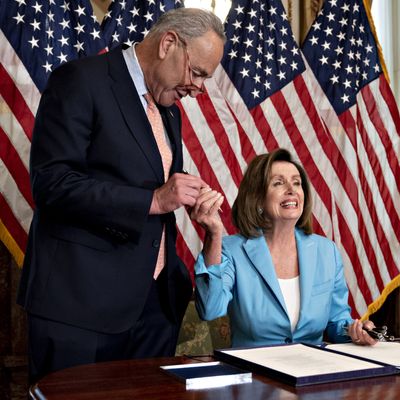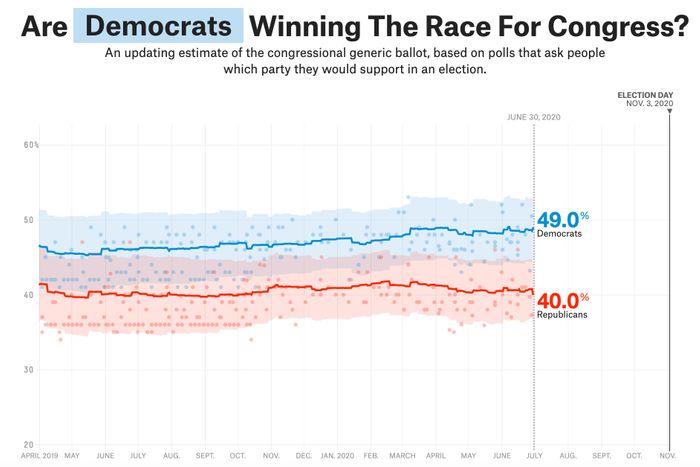
By now, you are probably aware that Donald Trump’s poll numbers have seen better days. The president trails Joe Biden by an average of 9.6 percent in RealClearPolitics’s poll of polls. On Tuesday, USA Today/Suffolk’s poll — which had Trump leading Biden last December — showed the Democratic nominee ahead by 12. No incumbent president has ever trailed by this much at this point in an election cycle. Trump’s numbers have been so uniformly and egregiously bad, even the poll-unskewer-in-chief admitted last week that he was losing telling Sean Hannity that Joe Biden is “gonna be your president because some people don’t love me, maybe.”
The GOP’s abysmal polling in the congressional generic ballot has garnered less attention. In today’s Suffolk poll, voters favored a Democratic Congress over a Republican one by 14 points. In 538’s polling average, Democrats boast a nine-point lead on the question of which party’s congressional candidates voters intend to support. In 2018, Democrats won the House “popular vote” by roughly eight points, the party’s best showing since the Watergate scandal, and a margin large enough to turn more than 40 districts blue. Thus, current national polling suggests Democrats are poised to consolidate their midterm gains and make further inroads into Republican territory this fall. And as the New York Times’s Nate Cohn notes, surveys of discrete swing-district House races are consistent with that story:
Republicans can lose the popular vote in a rout this November and still retain their Senate Majority. But if Biden beats Trump by ten points — while Democratic House candidates outpace GOP ones by nine — Chuck Schumer will probably be a Majority Leader come January.
Notably, a 2020 down-ballot landslide would represent a marked departure from events four years ago. Even as Hillary Clinton won the popular vote in 2016, Republican congressional candidates won 1.1 percentage points more ballots than their Democratic adversaries. This was partly attributable to the (then) GOP House majority’s incumbency advantages. But it also ostensibly reflected a widespread perception that congressional Republicans — and Donald J. Trump — were very different political entities.
As the Washington Post’s Dana Milbank reported in September 2016, a Democratic Party super PAC experimented with trying to damage GOP House candidates by linking them to Trump — and concluded that this did less to hurt down-ballot Republicans than it did to aid the GOP standard-bearer:
It seemed like a no brainer: Tie down-ballot Republican Candidate X to Donald Trump and watch Candidate X go down in his or her race for the Senate, the House or dog catcher…But does the cookie-cutter cut it?
The House Majority PAC, a super PAC trying to boost Democrats’ prospects in the House, polled in 25 competitive districts and noticed that tying the local Republican to Trump was only among the top-testing negative attack lines in three or four.
So Alixandria Lapp, the super PAC’s executive director, had a liberal group called the Analyst Institute run a controlled experiment, sending direct mail to 108,000 independents and Republicans in a half-dozen districts in California, Colorado, Illinois, Minnesota and Virginia.
The findings were intriguing. Those voters who received three pieces of mail tying the local Republican candidate to Trump (mainly on national security) increased their support for the Democratic congressional candidate by 2.7 percent over voters in a control group who received no mailings. But those who received mailings attacking the Republican on issues without mentioning Trump increased their support for the Democrat by 5.2 percentage points — nearly twice as much.
And the attempt to tie the local Republican to Trump actually backfired in a way, by hurting Hillary Clinton. Support for Clinton among those receiving the anti-Trump mailings declined 3.5 percent relative to the control group. Possibly, voters took the news that the local Republican congressional candidate backed Trump as a validation of Trump — evidence that he’s not as crazy as they thought.
Four years later, swing voters no longer recognize much distinction between the president and his party. The GOP’s loudest Trump skeptics have either been evicted from Congress or converted to the faith. On impeachment, coronavirus, and just about everything in between, congressional Republicans have made the president’s cause their own. And the public has taken note.































